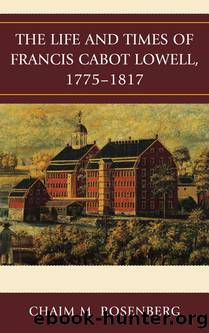The Life and Times of Francis Cabot Lowell, 1775-1817 by Rosenberg Chaim M.;

Author:Rosenberg, Chaim M.;
Language: eng
Format: epub
Publisher: Lexington Books/Fortress Academic
Published: 2010-01-01T00:00:00+00:00
The Textile Industry of Great Britain
The industrial revolution had gathered momentum for thirty years before Francis Cabot Lowell arrived in Great Britain. Before the introduction of machinery, the dressing, carding, spinning and weaving of cotton was done by hand in the cottages of the workers. The wives and daughters spun the yarn and the men folk wove the yarn into cloth, bought up for sale in the market places of the towns. Hundreds of thousands in the villages and towns of England and Scotland earned their keep in the home-craft textile industry. These textile workers made a decent living, supplemented by the produce of their gardens and milk from their cows.
The traditional methods of home spinning changed after 1764 with James Hargreavesâ invention of the spinning jenny. Born in the village of Stanhill, near Blackburn in Lancashire, Hargreaves worked as a weaver until he devised a machine that could spin several threads at the same time. Three years later, Richard Arkwright, a wig-maker by occupation, from Preston in Lancashire, improved on the jenny with his water-powered spinning throstle. The illiterate and humble James Hargreaves and the energetic Richard Arkwright were the men at the forefront of the British industrial revolution.
Richard Arkwright proved the better businessman. Despite the riots that followed the introduction of his spinning machine, Arkwright formed a company to build textile mills. The first Arkwright mill, powered by river water, opened in 1771. The next great technological advance in cotton spinning came from Samuel Crompton of Bolton in Lancashire with his mule, so called because it combined the functions of the spinning jenny and the throstle. Cromptonâs machine could spin a yarn so fine as to make muslin cloth. The machines devised by Hargreaves, Arkwright and Crompton were very heavy and required sturdily built factories to hold them. Manufacturers found it economical to build large factories with a single waterwheel, giving great impetus to the factory as the preferred system for spinning cotton. The manufacturer owned the mill, machinery and the raw materials. With the coming of the factory system the worker sold his labor for whatever price the marketplace offered.
In 1786, David Dale and Richard Arkwright founded the village of New Lanark, some thirty-five miles southwest of Edinburgh, where they built cotton mills using the power of the River Clyde. By the 1780s the British cotton spinning factories provided the quarter million weavers of the nation with an unlimited supply of yarn at reasonable prices. So pleased was the British government with the invention of the water frame that, in 1787, they awarded Richard Arkwright the majestic sum of £10,000. That year, there were already 143 textile mills in Great Britain.
The power to turn the machines in the factories came at first from horses moving in rotation. With the invention of the waterwheel, power came from the rivers and streams. In England, with slower rivers, the steam engine, first installed in 1785, rapidly became the preferred source of power.
Edmund Cartwrightâs power loom was the next great advance in textile machinery.
Download
This site does not store any files on its server. We only index and link to content provided by other sites. Please contact the content providers to delete copyright contents if any and email us, we'll remove relevant links or contents immediately.
| Americas | African Americans |
| Civil War | Colonial Period |
| Immigrants | Revolution & Founding |
| State & Local |
In Cold Blood by Truman Capote(3375)
The Innovators: How a Group of Hackers, Geniuses, and Geeks Created the Digital Revolution by Walter Isaacson(3157)
Steve Jobs by Walter Isaacson(2889)
All the President's Men by Carl Bernstein & Bob Woodward(2369)
Lonely Planet New York City by Lonely Planet(2218)
And the Band Played On by Randy Shilts(2197)
The Room Where It Happened by John Bolton;(2151)
The Poisoner's Handbook by Deborah Blum(2135)
The Innovators by Walter Isaacson(2098)
The Murder of Marilyn Monroe by Jay Margolis(2095)
Lincoln by David Herbert Donald(1982)
A Colony in a Nation by Chris Hayes(1927)
Being George Washington by Beck Glenn(1921)
Under the Banner of Heaven: A Story of Violent Faith by Jon Krakauer(1789)
Amelia Earhart by Doris L. Rich(1690)
The Unsettlers by Mark Sundeen(1682)
Dirt by Bill Buford(1671)
Birdmen by Lawrence Goldstone(1662)
Zeitoun by Dave Eggers(1643)
